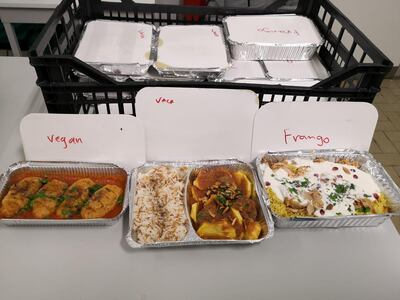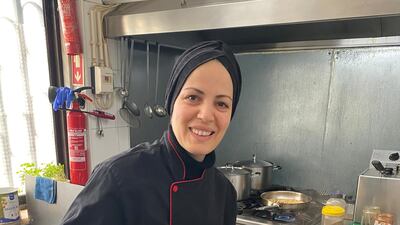A Syrian refugee couple who have become minor celebrities in Lisbon for offering free food to the city’s frontline medical workers have said they are hopeful as Portuguese officials announce an easing of lockdown restrictions.
Alan Ghumim and his wife Ramia Abdalghani, both 36, began offering free food to healthcare workers when lockdown measures to prevent the spread of the novel coronavirus were introduced in Portugal in mid-March.
Mr Ghumim told The National that it had been dispiriting to see the vibrant city where he and his wife have made their home go into lockdown.
“I feel very sorry. Normally Lisbon is full of life,” the restaurateur explained. “Normally, people sit in the cafes. But now everything is empty.”
However, despite the challenges presented by the coronavirus and with the Portuguese government poised to relax its coronavirus measures, the Syrian refugee in Lisbon says there is still hope for the future.

“It is a pity when you see things like this but there is hope we will come back,” Mr Ghumim said.
Portugal’s national response to the coronavirus has been heralded as a relative success story as Europe grapples with the disease. Despite the country’s ageing population, it has coped far better with the Covid-19 outbreak than, for example, its neighbour Spain.
Portugal has announced 714 deaths and 20,206 Covid-19 cases since the beginning of the outbreak while Spain has recorded 21,852 deaths and over 200,000 cases.
The government’s close monitoring of the situation has meant it is now considering easing the lockdown at the start of May.
Prime Minister Antonio Costa said he hopes to relax restrictions on schools, shops, restaurants and cultural spaces from May onwards but such a plan would require new rules to keep people safe.
Until May 2 most non-essential businesses will remain shut, and restrictions on movement and gatherings will remain in place.
Mr Costa said the plan, which is likely to be announced on April 30, could limit the number of people visiting beaches across the country which are usually crowded during summer.
Mr Ghumim explained that he and his wife had learnt from their own experiences, first when the war came to their families’ homes in Damascus and then as they fled to Portugal via Morocco, that it was important to help in times of crisis.
“First we came to this country as refugees and everybody welcomed us,” Mr Ghumim explained. We wanted to return the help so we helped. These things work in a domino effect. If you help someone then someone will help you. We need to support each other in this difficult time.”
The pair started their restaurant in February of last year after a catering business Ms Abdalghani started took off. From its inception their restaurant Tayybeh looked to benefit the community, employing local Syrian women, who were struggling to find work, in their kitchens.
They began offering free meals to health workers at the beginning of the lockdown through Facebook and word quickly spread.
“We made one post and we got the calls. Then it just passed on through word of mouth. A nurse tells a doctor, one hospital tells another hospital. So we became famous in Lisbon,” Mr Ghumim said.
Now the restaurant is giving out 75 free meals a day to health workers and receives calls for help from outside Lisbon. Their menu changes every week depending on what ingredients are available. Two meat and two vegan dishes are consistently on offer as well as creamy hummus and other Middle Eastern appetisers.
The restaurant is busiest in the evening when health workers are either returning from their shifts to their families or taking food to their colleagues in the hospitals.
“We have many messages [of thanks]. I always spend the afternoon replying to the messages from people saying thank you and saying the food is great. This gives us more energy also,” Mr Ghumim said.
Despite the attention the restaurant has received for its work the owner said the highest accolades should be reserved for Portugal’s health workers.
“They are heroes,” he said. “This is a very simple way of describing what they are doing. I cannot say more because they do so much,” he added.

